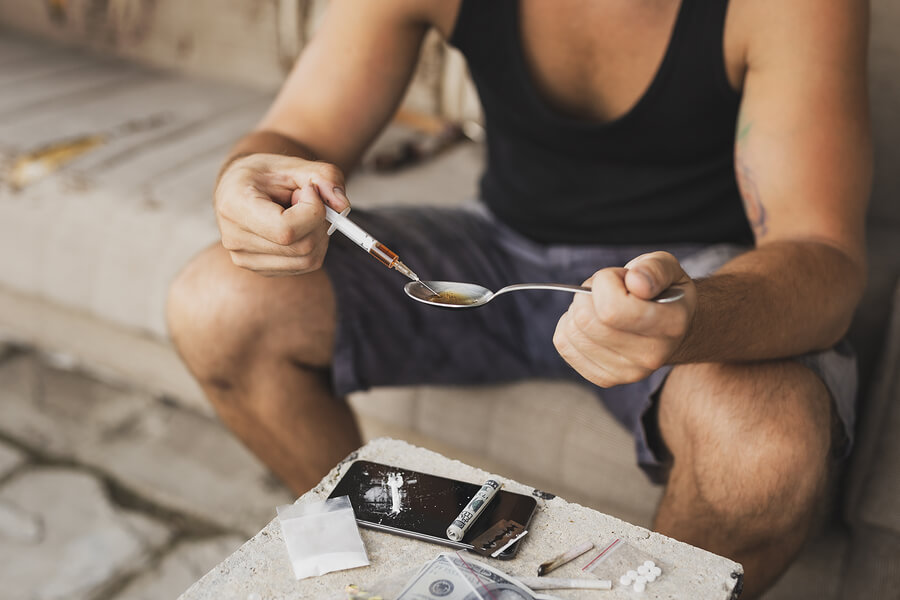No one sets out to become addicted to heroin. Maybe you started taking opioids and found heroin to be a cheaper alternative with more powerful effects. After all, there’s an immediate sense of euphoria from heroin that melts away any pain or anxiety you’re feeling.
That’s why heroin is often referred to as a wonder drug by people who take it. But experiencing this euphoria comes at a high price. That sense of calm and balance you once felt eventually turns into complete and total devastation. Substance abuse can wreak havoc on your body even after just one use.
We all know that heroin is bad for your health and can even lead to overdose or death, but what does it do to your body? This article will explore the effects of heroin on the body to highlight the dangers lurking behind the drug. We will also address how heroin affects the body in both the short and long-term.
Why is Heroin so Addictive?
Heroin is an opiate that attaches itself to your brain’s opioid receptors. It floods your brain with an unusually high amount of dopamine that’s too much for your brain to resist. Quickly, your brain wants to experience it again and again, requiring larger doses more often to feel the same amount of pleasure you felt the first time. This is how many users begin to fall into the cycle of addiction.
How Does Heroin Affect the Body in the Short-Term?
Because heroin is so addictive, users will need more heroin to feel most of the same effects as the first time. Although the effects can slightly differ from person to person, some of the immediate effects on your body include:
- Dry mouth
- Flushing of the skin
- Extreme drowsiness
- A feeling of heaviness in the arms and legs
- “Nodding out”, or alternating between conscious and semi-conscious states
- Impaired brain function
After the initial “rush” of euphoria, users may experience several hours of drowsiness. A user’s breathing and heart rate will also slow down, sometimes to dangerous levels. After the effects of the drug have worn off, the withdrawal symptoms begin.
Some of the withdrawal symptoms of heroin abuse include insomnia, anxiety, muscle aches, and flu-like symptoms. Unfortunately, these short-term effects and withdrawal symptoms aren’t the only problems you have to look out for when using heroin.
How Does Heroin Affect the Body In the Long-Term?
Heroin has a devastating impact on several of the organs in your body. Repeated heroin use can cause major damage to your lungs over time. In fact, lung diseases are quite common for heroin users. While you might feel relaxed and at peace on heroin, your body is suffering behind the scenes.
Another casualty of heroin abuse is your veins. By injecting heroin, you’re at risk of collapsed or scarred veins, which can lead to dangerous blood infections if left untreated.
When it comes to heroin, your heart bears the heaviest burden. It’s no surprise that needles and bits of cotton used to take the drug are home to plenty of bacteria. This bacterium can lead to heart infections and even cause damage to your heart valves.
And we can’t forget what heroin does to the brain. Recent research has shown that heroin abuse causes white matter in the brain to deteriorate. That means your ability to control your behavior and regulate stress weakens, and you won’t be able to make decisions the way you used to.
Heroin can also negatively impact mental health disorders, like depression, anxiety, and bipolar disorder. These changes and interactions can make you more prone to relapse, trapping you in a cycle of abuse where the ability to escape and recover doesn’t feel possible. That’s why it’s important to choose a heroin rehab center with dual diagnosis treatment.
Break Free from the Cycle of Heroin Addiction at Silver Maple Recovery
You’ve come a long way from the very first time you got high on heroin. That bright euphoria is now overshadowed by the dark path heroin has taken you down. Mental health issues have begun to occur that are influencing your use. It may seem like there are no treatment options to stop using. But with the right heroin addiction treatment program, there’s hope for you to break the cycle of addiction and regain a life without the constant cravings for heroin.
At Silver Maple Recovery, we use evidence-based therapy methods to help you regain control of your life. Backed by our staff with an average of 24 years of local addiction experience, we’re ready to help you achieve lasting recovery. Silver Maple Recovery offers detox services in-house, so you can transition seamlessly from detox to inpatient treatment.
No matter the obstacles you face with heroin addiction, change is possible. Contact us today to learn more about our heroin addiction treatment program.







